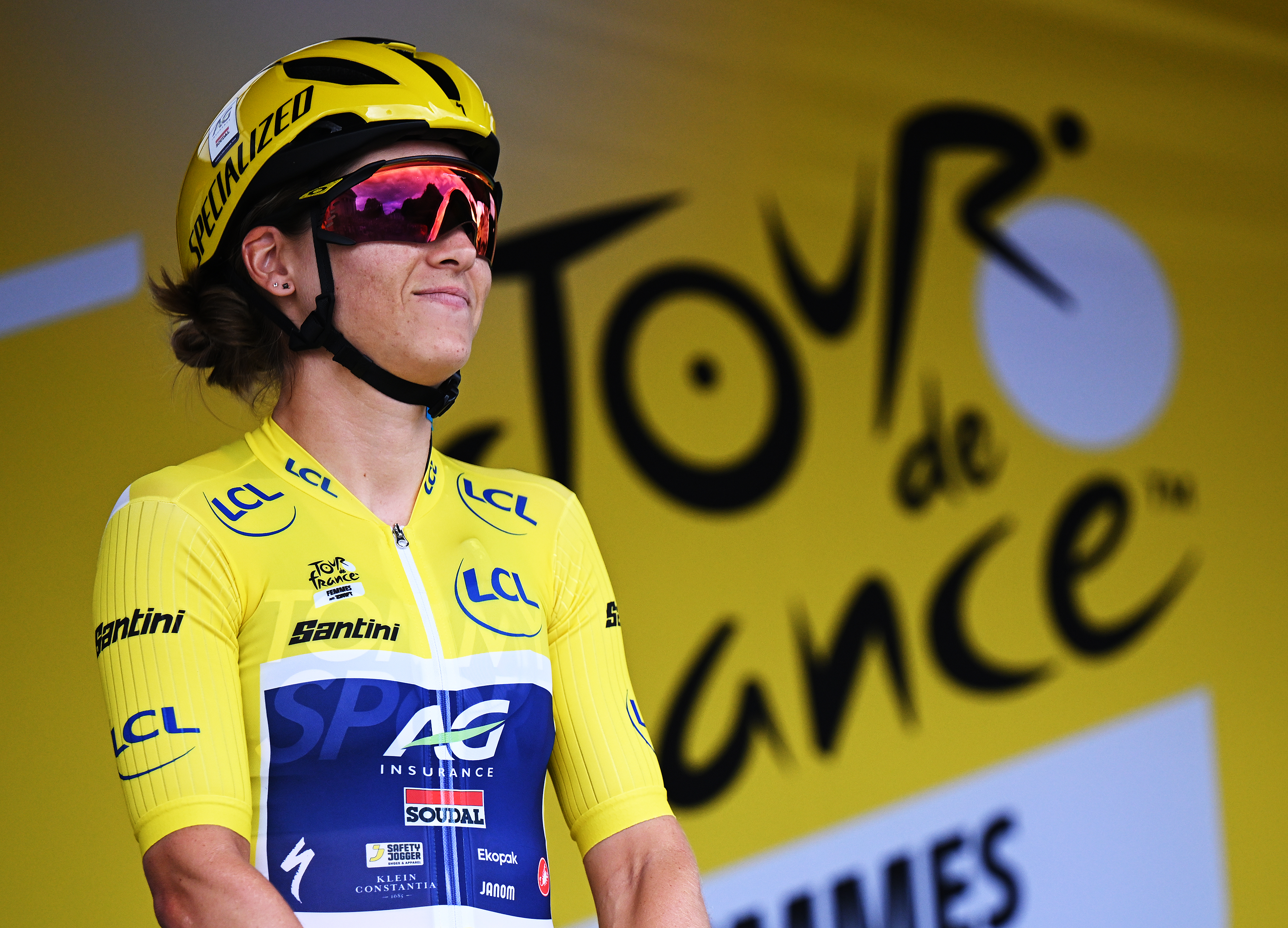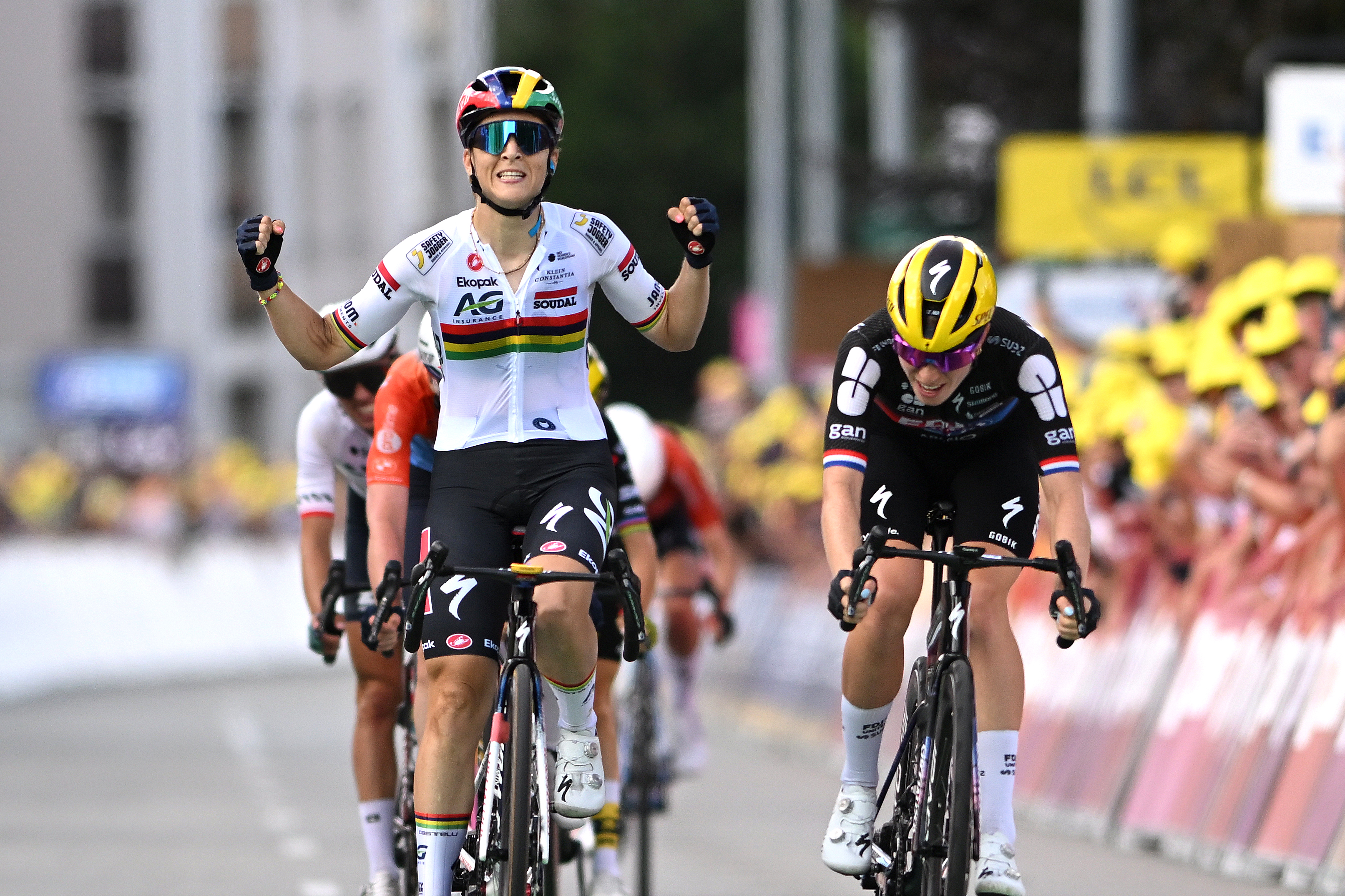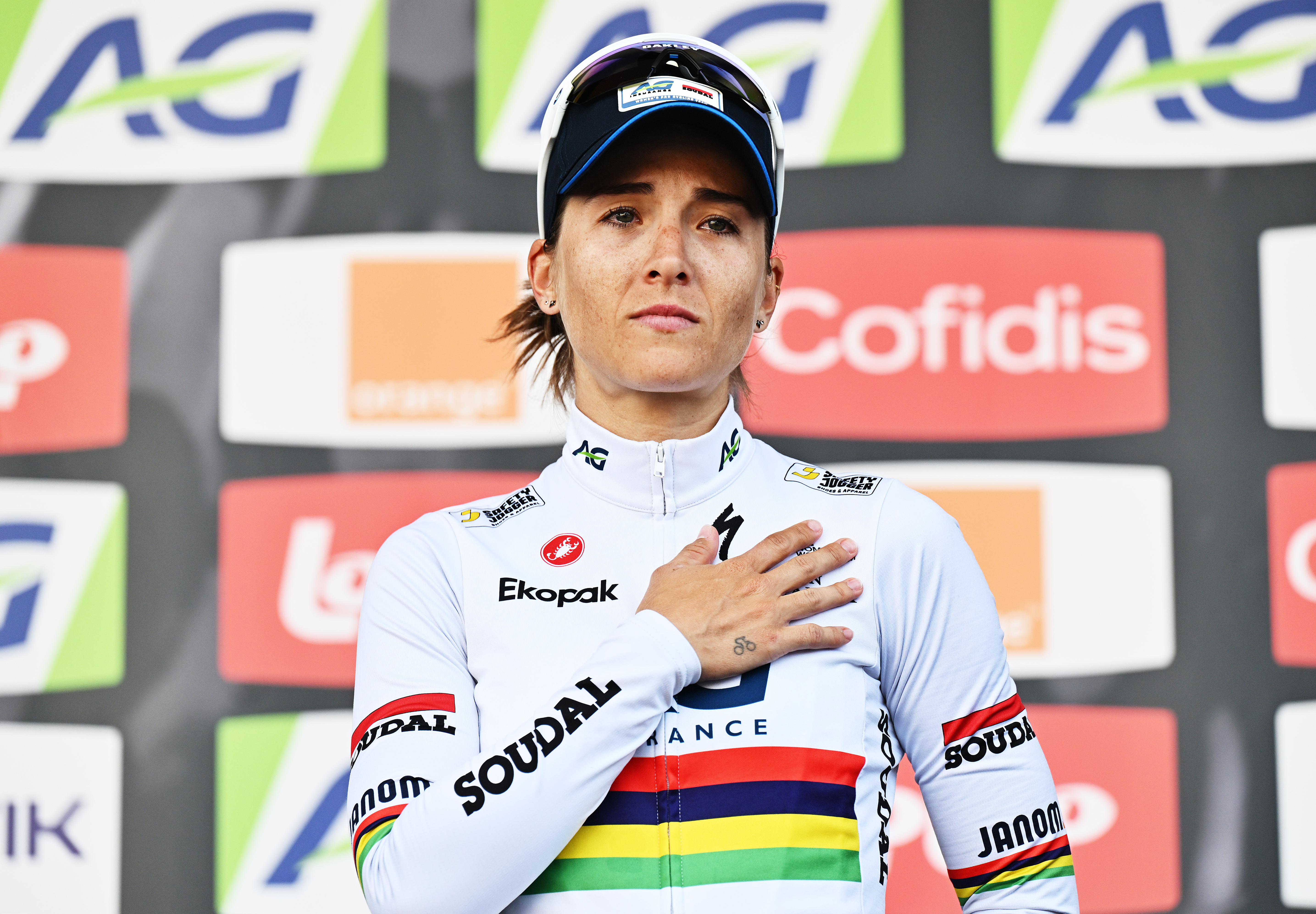Who is Kim Le Court-Pienaar? Meet the Tour de France Femmes history-maker
The 29-year-old Mauritian once quit road racing – now she's in the yellow jersey


For the second time in a week, Kim Le Court-Pienaar buried her face in her hands. Wearing the yellow jersey at the Tour de France was a fantasy that had never even crossed her mind growing up, 9,000km away, on an island in the Indian Ocean. Now, with a stage victory in the town of Guéret, she had achieved it twice.
A smile beaming across her face, she took to the podium to receive her honours. “I think just having it on my shoulders is already a dream come true for me,” she said. “Well, stage three, having it on my shoulders, was really a dream come true – I was living it like it wouldn’t happen again, and now it’s happening again. It’s really amazing.”
Le Court’s pro career, still only 18 months old, has been one of historic firsts. She’s the first Mauritian – male or female – to compete at cycling’s highest level, after signing for WorldTour squad AG Insurance-Soudal. She’s the first African to win a Monument. As of Sunday, she’s the first African woman to lead the Tour. And now she’s the first to win a stage, too. “I think someone needs to hit me in the face to make me realise,” she said.
Her path to the yellow jersey has been unconventional and unique. From overcoming a malaria scare, to abandoning her road racing career, and later emailing teams to ask for a contract, here’s how she worked her way to the Tour’s top step.
Born in Curepipe, the second biggest town in Mauritius, Le Court jokes that her childhood consisted of “beaches and coconuts”. She was brought up by a Scottish mother and a Mauritian father, of French descent, alongside an older brother, who too would later become a road cyclist.
At three years old, however, Le Court’s life came under threat. Diagnosed with malaria on a trip to France, she ended up in a coma, given a 10% chance of survival. “In France, they didn’t really know what malaria was,” she told Sporza. “They kept saying it was a fever. Because of this, they caught it very late, and the disease had already penetrated deep into my body.”
In time, the doctors were able to treat her and find a cure – “miraculously,” her father told Le Parisien. The day after she woke up, she rode a bike through the corridors of the hospital. “It was as if I was destined to be a cyclist,” she said.
The latest race content, interviews, features, reviews and expert buying guides, direct to your inbox!

Le Court's Tour de France Femmes stage win in Guéret brought a second stint in the yellow jersey.
Inspired by her brother, Le Court got her first proper bike when she was 12. She raced against the boys at home in Mauritius, for lack of a large enough girls’ field, before moving to South Africa in her teenage years. There, she dived into mountain biking, a discipline in which she now counts multiple Continental-level medals.
In 2015, then only nineteen, Le Court joined her first UCI road team, a British squad called Matrix Fitness. One of her first races was the UK's Women's Tour, where she finished dead last, an hour down. The following season, she swapped to a Spanish team, but the level still proved too high.
“It didn’t go very well at all,” she remembers. “I was a DNF or last place in every race, so it really wasn’t a memory to remember.”
Her European dream over, she packed her bags and moved back to South Africa. She’d then spend the next seven years competing on her mountain bike – winning big races like the Cape Epic and Swiss Epic – and working part-time as a bike fitter.
Come the summer of 2023, however, and Le Court was ready to give road racing another stab. “I’d achieved all my mountain bike goals, so I wanted a new challenge,” she says.
“My husband started sending emails [to teams] in August, which was actually very late – I only realised it was extremely late once I was in a team in 2024, and contracts were already getting signed in March. I don’t know how I got the chance. I think I maybe reached the right person at the right time.”
That person was Natascha Knaven-den Ouden, the then manager of Le Court’s current AG Insurance-Soudal. “When I ‘discovered’ her, she was already older than most development riders,” says Knaven-den Ouden. “What stood out wasn’t just her numbers, it was how she raced: smart, committed, instinctive. It was with incredible mindset. That’s the kind of talent you see when you look beyond power numbers and truly understand racing.”
Within months of joining the squad, Le Court was winning big. She did the double at the Mauritian National Road Championships in June, and the following month, won her first Grand Tour stage at the Giro d’Italia Women. Less than a year later, she took a momentous victory at Liège-Bastogne-Liège – “I only knew I was the first African to win a Monument after the race,” she says.
The victory, celebrated in her national jersey, thrust Mauritius into the global spotlight. An island, smaller in size than the English county of Worcestershire, had produced one of the best talents in the sport.

Liège-Bastogne-Liège was only Le Court's second pro victory.
Having targeted stage wins in last year's edition, Le Court came to this Tour de France Femmes with the goal of winning the yellow jersey. “She’s focused and she knows what she wants,” says her team-mate Sarah Gigante. “She’s also really kind and appreciative as well. I think that’s super important in a leader.”
Second on stage one, a third place the following day was enough to move her into the race lead. So special was the feat that she refused to believe it at the time, telling her team staff at the finish line in Quimper that she “wanted to see it for myself”. The confirmation soon came, and so did the tears.
Back home, the prime minister of Mauritius, Navin Ramgoolam, toasted the “remarkable achievement” of Le Court’s yellow jersey on social media. “She is an inspiration to our youth, and a source of immense national pride,” he wrote. “Thank you for flying the flag for our country so high.”
Le Court’s first stint in yellow would only last a day. Now, after outsprinting her GC rivals to win stage five, she’s taken the jersey back. Can she keep it until the end? “We’re going into the mountains now and I don’t know how I’ll do against the pure climbers,” she says. Still, she adds: “Anything can happen.”
It all feeds into Le Court’s ongoing, wider goal – something that transcends the Tour and the colour of the threads that make up her jersey. “I want to keep on growing African cycling for women, and for men, in general, and try and motivate the young women out there that it’s possible,” she says.
“Ten years ago, I was barely finishing races – I almost gave up on the sport – and now I’m sitting here with yellow on my shoulders at 29 years old. It really is possible.”

Tom joined Cycling Weekly as a news and features writer in the summer of 2022, having previously contributed as a freelancer. He is fluent in French and Spanish, and holds a master's degree in International Journalism. Since 2020, he has been the host of The TT Podcast, offering race analysis and rider interviews.
An enthusiastic cyclist himself, Tom likes it most when the road goes uphill, and actively seeks out double-figure gradients on his rides. His best result is 28th in a hill-climb competition, albeit out of 40 entrants.
You must confirm your public display name before commenting
Please logout and then login again, you will then be prompted to enter your display name.